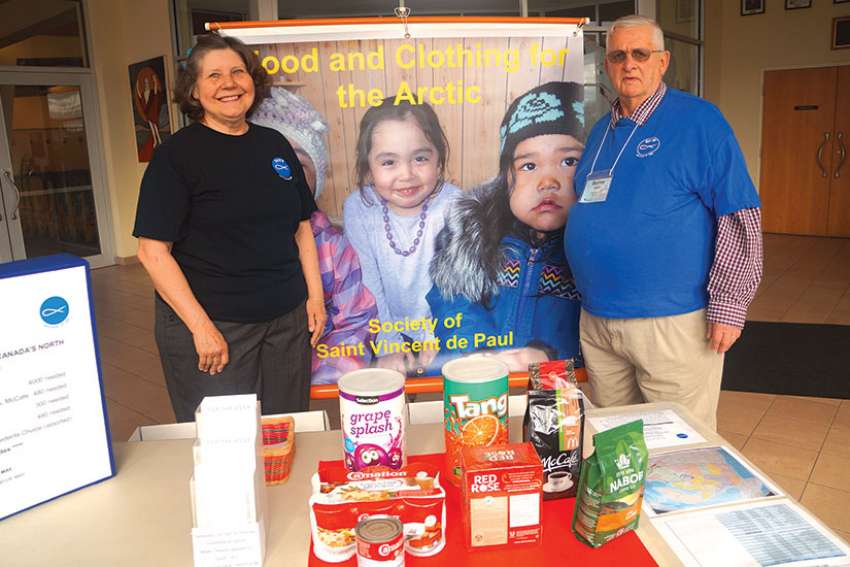What began as a small project out west to aid one remote community in need has spread into a cross-country effort to help feed and supply a dozen towns.
Ontario members of the Society of St. Vincent de Paul have adopted five Nunavut communities to support through the shipments of food and other goods.
Parishes in Ottawa, Windsor, St. Catharines, Kitchener-Waterloo and elsewhere are collecting items to fill sea containers that will go to Rankin Inlet, Whale Cove, Gjoa Haven, Taloyoak and Naujaat, formerly Repulse Bay.
“We’ve got a great committee going on it,” said Bernie Hartlin of Holy Redeemer parish in Ottawa, coordinator for Ottawa’s English-speaking Society members.
Pegg Leroux, one of the two vice presidents for the Society’s Ontario region, has spearheaded Ontario’s involvement in the North of 60 project.
The Society decided to extend the helping hand to Nunavut at the region’s annual general assembly (AGA) in 2015. “We only had an inkling of what the situation is,” she said.
In October 2015, Leroux visited Rankin Inlet, a regional hub of more than 3,000 people, and Whale Cove, a small community of about 400. Her 10-day trip was “a learning experience.”
“I listened to their daily lives. I listened to the differences in our northern brothers and sisters.”
While she knows there is poverty in the south, the desperate situation in the north “has become a part of every wakeful moment I’ve had since then.”
She has been up three times now “just to learn.”
“What I learned from my brothers and sisters up north was the biggest thing we have to establish was trust,” she said. “There have been so many promises made, either not lived up to or broken promises.”
In 2016, the Society was able to send two sea containers, which each hold 10,000 pounds of goods and were also able to send some shipments by plane.
Ontario has followed the example set by Peter Ouellette, a Vincentian in Edmonton who mentored Leroux for about six months.
The North of 60 project started through a personal relationship between Eileen Orysiuk of Calgary and Sr. Faye Tromblay, a missionary who has been in Tuktoyaktut, N.W.T., for a dozen years. Together, they organized friends and family about 10 years ago to get supplies for the northern community, Ouellette said.
Orysiuk died in 2013 after battling brain cancer, but Ouellette said her work has left a lasting legacy.
“I came in the second year they were working on this,” he said. “Eileen was on her deathbed. She said to me, ‘Don’t forget the north.’ She made me promise and I took that to heart.”
Ouellette moved aggressively to enlist corporate donations from trucking companies, storage companies and others to facilitate the project. After the Vincentians took over, they increased donations to three communities by the next year. They now serve 12.
He hopes as Vincentians in Ontario, Quebec and elsewhere catch the vision, the Society will have the capacity to assist all of the people in need in the Arctic.
“When we start with a community we don’t accept failure, so it’s a long-term commitment,” he said. “We are hoping to move from providing the assistance to helping them change with a hand up in various aspects of their life and that has worked.”
The Society was able to initiate a driver’s training program through a donated Jeep Cherokee which in turn led to helping people find better jobs.
“Systemic change is the long term objective,” Ouellette said.
The program is primarily one of food security and nothing is shipped that is not requested, he said.
During a trip to Nunavut last May, Leroux asked what people wished to receive for Christmas. “The first thing out of their mouth was flour, then sugar, baking powder,” she said. “They could have asked for the sun, the moon and the stars, but they asked for essential food items so they could make bread — bannock.”
Prices for everyday goods are exorbitant because most items have to be flown in.
“They’ve been paying these prices for years,” Leroux said.
“The parents can be hungry for days to make sure their children eat.”
More information on the North of 60 project is available at the Society’s website, www.ssvp.ca/north-60.

